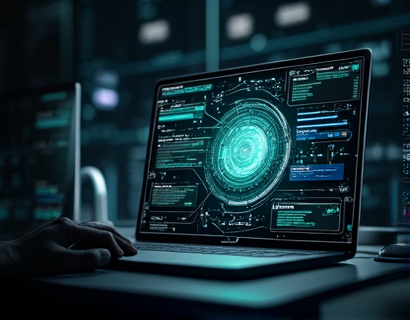Unlocking Next-Gen Productivity and App Accessibility Through AI and Crypto Fusion
The integration of Artificial Intelligence (AI) and cryptocurrency is ushering in a new era of digital innovation, one that promises to revolutionize how we interact with technology and manage our daily tasks. This fusion of technologies is not just about enhancing existing systems but about creating entirely new paradigms for productivity and accessibility. For tech enthusiasts and early adopters, this convergence opens up a world of possibilities, offering tools that are smarter, more secure, and more user-friendly than ever before.
The core of this transformation lies in the unique capabilities of AI and the inherent advantages of cryptocurrency. AI brings intelligence, adaptability, and automation to digital solutions, enabling systems to learn from data, recognize patterns, and make decisions with minimal human intervention. On the other hand, cryptocurrency provides a decentralized, secure, and transparent method for transactions and data management, reducing reliance on centralized authorities and enhancing user control over personal data.
Enhancing Productivity with AI-Powered Tools
One of the most immediate impacts of AI in the digital space is the enhancement of productivity tools. Traditional task management applications are being reimagined with AI at their core, offering smarter scheduling, automated reminders, and predictive analytics to optimize workflows. These AI-driven tools can analyze user behavior and preferences to suggest the most efficient ways to complete tasks, effectively acting as personal digital assistants.
For instance, AI can predict the best times for meetings based on participants' schedules and availability, reducing the back-and-forth of email exchanges. It can also automate repetitive tasks such as data entry, freeing up valuable time for more strategic work. By learning from past actions, these tools become more intuitive, adapting to the user's workflow and preferences to provide a personalized experience.
Decentralization and Security through Cryptocurrency
Cryptocurrency plays a pivotal role in this new digital landscape by providing a decentralized and secure framework for these AI-powered tools. Unlike traditional systems that rely on central servers, cryptocurrency-based solutions distribute data across a network of nodes, making them more resilient to attacks and data breaches. This decentralization ensures that user data remains private and secure, a critical concern in an era where data privacy is paramount.
Moreover, cryptocurrency enables seamless and secure transactions within these digital ecosystems. Smart contracts, self-executing contracts with the terms directly written into code, can automate payments and transactions without the need for intermediaries. This not only reduces costs but also speeds up processes, making the entire system more efficient and user-friendly.
Accessibility and Inclusivity
The combination of AI and cryptocurrency also addresses issues of accessibility and inclusivity. Traditional digital tools often require significant resources and technical knowledge to use effectively, creating a barrier for many users. AI-driven interfaces can adapt to different user needs, providing assistance to those with disabilities or those who are less tech-savvy. For example, voice-activated assistants powered by AI can make technology more accessible to individuals with visual impairments or motor disabilities.
Cryptocurrency further enhances this by providing financial inclusion. In regions where traditional banking systems are underdeveloped, cryptocurrency offers a way for people to participate in the digital economy. By using cryptocurrency-based apps and services, individuals can access a wide range of tools and resources without the need for a traditional bank account, bridging the gap between the digitally connected and disconnected.
Innovative Digital Solutions
The synergy between AI and cryptocurrency is giving rise to innovative digital solutions that redefine productivity and app accessibility. One such solution is decentralized application (dApp) marketplaces, where developers can create, publish, and monetize AI-powered applications without the need for centralized approval. These marketplaces leverage blockchain technology to ensure transparency, security, and fair compensation for developers.
Another exciting development is the creation of AI-driven virtual assistants that operate on blockchain networks. These assistants can manage a wide range of tasks, from scheduling and reminders to complex data analysis, all while ensuring that user data remains secure and private. The decentralized nature of these assistants means that users have full control over their data, with the option to share it selectively and revoke access at any time.
Case Studies and Real-World Applications
To better understand the practical implications of this technology fusion, let's look at a few real-world applications. In the realm of project management, an AI-powered dApp can integrate with various blockchain-based tools to create a comprehensive workflow management system. This system can automatically allocate tasks based on team members' availability and expertise, track progress in real-time, and ensure that payments are made transparently and securely using cryptocurrency.
In the healthcare sector, AI-driven diagnostic tools combined with cryptocurrency-based patient data management systems can revolutionize how medical information is handled. These systems can securely store and share patient data across different healthcare providers, ensuring that critical information is always up-to-date and accessible when needed. AI algorithms can analyze this data to provide accurate diagnoses and personalized treatment plans, all while maintaining patient privacy through blockchain encryption.
Challenges and Future Prospects
Despite the numerous benefits, the integration of AI and cryptocurrency is not without challenges. One of the primary hurdles is the technical complexity involved in developing and maintaining these systems. Developers need a deep understanding of both AI and blockchain technologies to create robust and efficient solutions. Additionally, regulatory frameworks are still evolving, and there is a need for clearer guidelines to ensure compliance and protect users.
However, the future looks promising. As more developers and organizations recognize the potential of this fusion, we can expect to see more innovative solutions emerge. The ongoing advancements in AI and blockchain technology, coupled with increased adoption and user familiarity, will continue to drive this transformation forward. The next generation of digital tools will be smarter, more secure, and more accessible than ever before, empowering users to achieve greater productivity and efficiency in their daily lives.
In conclusion, the combination of AI and cryptocurrency is not just a technological trend but a fundamental shift in how we approach digital solutions. By leveraging the strengths of both technologies, we can create a more inclusive, secure, and efficient digital world. For tech enthusiasts and early adopters, this is an exciting time to be part of, as the possibilities are truly limitless.










































